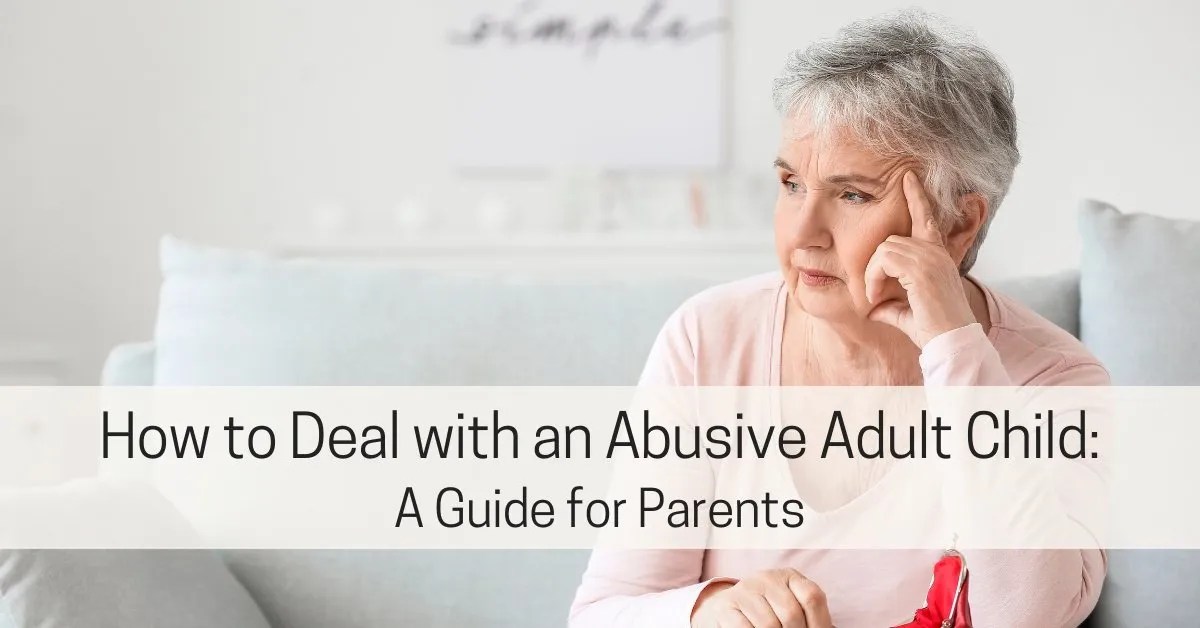No parent expects to find themselves searching “how to deal with abusive adult child” in the middle of the night, yet here you are. The child you raised, worried about, and sacrificed for now leaves you walking on eggshells, questioning your reality, or dreading their phone calls. This isn’t the relationship you imagined when you held them as a baby or cheered at their graduation.
The shame around family conflict and estrangement makes it even harder. While other parents talk about weekend visits and heartfelt calls, you sit with the sting of your child’s harsh words and wonder what you did to deserve this. Society expects unconditional parental love, but what happens when that love becomes a weapon used against you?
Learning how to deal with an abusive adult child is one of the most painful challenges a parent can face. This article addresses a difficult truth: sometimes our adult children hurt us in ways that damage our mental health and quality of life. More importantly, it offers concrete strategies for protecting yourself while navigating this complex relationship.
Signs You’re Dealing with an Abusive Adult Child
Abuse from an adult child often goes unrecognized because it doesn’t match typical images of family violence. The most common forms are emotional and psychological, leaving invisible but lasting wounds.
Abusive behaviors include:
- Constant criticism that makes you feel inadequate
- Manipulation to control your perception of reality (“That never happened”)
- Guilt-tripping that exploits your parental love
- Threats to withdraw affection or cut contact
- Ignoring boundaries you’ve set
- Demanding money with no intention of repaying
- Taking possessions without permission
- Verbal attacks, name-calling, or public humiliation
- Creating one-sided relationships where you’re always giving
- Dismissing your feelings as unimportant
Understanding Your Feelings
It’s normal to experience a mix of emotions: sadness, anger, confusion, and profound disappointment. You may grieve the relationship you hoped for while still struggling with love for your child despite their harmful behavior. This emotional complexity comes with being a parent.
Many parents find themselves caught in patterns of codependency or enmeshment, where their emotional well-being becomes too tied to their adult child’s moods, choices, or approval. You might feel responsible for their happiness or believe you must sacrifice your own needs to maintain the relationship. Recognizing these patterns is crucial because they make you more vulnerable to manipulation and abuse.
Your adult child may be struggling with their own issues—unresolved trauma, mental health challenges, or substance abuse. While this context can help you understand their behavior, it doesn’t excuse abuse or obligate you to accept it. Understanding someone’s pain doesn’t mean absorbing it as your own.
Strategies for Dealing with an Abusive Adult Child
It’s hard to accept that you cannot change another person, especially an adult who doesn’t recognize their behavior as problematic. Your power lies in changing how you respond and protecting yourself.
- Be clear about what you will and won’t accept or do (For example, “I’m not going to lend you money.” Or “You cannot come over unannounced.”)
- Stay consistent—when boundaries are tested, resist the urge to give in
- End phone calls, leave gatherings, or limit contact when boundaries are crossed
- Remember that boundaries are to protect you, not punish them
If necessary, try loving from a distance:
- Reduce the frequency of phone calls, visits, or text exchanges
- Meet in public places or involve other family members
- Communicate primarily through email or text to create a record
- Practice “detaching with love“—maintaining emotional distance while still caring about their well-being from afar
- Set time limits for interactions
- In severe cases, temporary or permanent no-contact may be necessary
Don’t engage in arguments:
- Avoid JADE, an acronym of justifying, arguing, defending, and explaining
- Use the “gray rock” method—respond minimally and neutrally
- Don’t share personal information that can be used against you
- If conversations become abusive, state calmly that you won’t tolerate the behavior and leave or disconnect
Prioritize self-care:
- Stay physically healthy through nutrition, exercise, and sleep
- Reconnect with hobbies and activities that bring you joy
- Spend time with supportive people who validate your experience
- Practice stress-reduction techniques like meditation or journaling
Release the need for their approval:
- Recognize that abusive adult children often weaponize disapproval to maintain control
- Your value as a person isn’t determined by their opinion of you
- Work on validating yourself rather than seeking their validation
- Remember that you have worth beyond being a parent
Have Realistic Expectations for Change
Hoping for positive change is natural, but it’s important to be realistic. Meaningful change requires the person to acknowledge their behavior, take responsibility, and commit to professional help, all of which are rare in cases of significant abuse or narcissistic traits.
Ask yourself these questions:
- Has your child ever genuinely apologized without making excuses or blaming others?
- Have they shown consistent effort to change after facing consequences?
- Are they willing to seek therapy or acknowledge they have a problem?
- Do they take responsibility for their actions, or do they always find someone else to blame
- What have you already tried to improve the relationship, and what were the results?
- Are you holding onto hope for a relationship that consistently harms your mental health?
If the answers suggest little likelihood of change, it may be time to adjust your expectations and focus more on protecting yourself rather than hoping for transformation.
Find Support and Release Shame When Dealing with an Abusive Adult Child
The shame many parents feel is profound but misplaced. In most cases, parents do not cause their adult child’s abusive behavior, and you’re not responsible for their choices.
Support resources to consider:
- Find a therapist who understands family dynamics and narcissistic abuse
- Consider individual therapy to address anxiety, depression, your own history of abuse, emotional neglect, or other concerns
- Join a support group (online or in-person)
- Confide in trusted friends or family who can offer perspective
A note of caution: Avoid toxic support spaces that encourage hatred toward adult children or frame all problems as entirely their fault. While your pain is valid, communities that vilify adult children often keep you stuck in anger rather than helping you heal and move forward. Look for groups that focus on your recovery, boundary-setting, and emotional health rather than attacking or diagnosing your child.
Moving Forward
Protecting your peace isn’t giving up on your child—it’s refusing to sacrifice your well-being for someone who chooses to harm you. This decision requires courage and often goes against every parental instinct, but it’s sometimes necessary for your mental and emotional health.
Remember that healing is possible. With proper support, clear boundaries, and focus on your own well-being, you can navigate this painful chapter while preserving your sense of self. You deserve to live free from abuse, regardless of who the abuser is.
©2025 Dr. Sharon Martin, LCSW. All rights reserved. Photos courtesy of Canva.com.
Read More
Publisher: Source link






